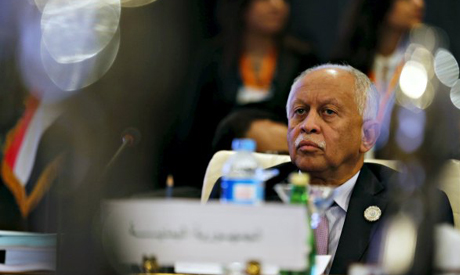
Yemen's Foreign Minister Riad Yassin attends the foreign ministers of the Arab League meeting ahead of the Arab Summit in Sharm el-Sheikh March 26, 2015 (Photo:REUTERS)
AO: For how long will Yemeni President Abd-Rabbo Hadi stay in Riyadh? And does he have a political plan?
RY: There is no talk of a political plan for now. We have started a military operation, and all issues are postponed until the operation achieves its objectives.
AO: Is there a time limit for the operation?
RY: It will not stop unless the goals are accomplished. We hope this will happen within a short time span.
AO: Do you think ground troops will be required?
RY: It is very possible to start an operation with troops but this is something to be determined by the facts on the ground.
AO: What are the goals you are wishing to accomplish?
RY: We want the Houthis to return from where they came from and leave the military camps they have put their hands on.
AO: But you said the military operation will be followed by talks involving all parties?
RY: Yes, but not now. The operation should achieve its goals first.
AO: You met Russia's special envoy today. Did he deliver any direct or indirect message from the Iranian side?
RY: Iran's statements come only through the media, but Tehran didn't send any messages or engage in talks with President Hadi, nor the legitimate government.
AO: What is the Russian position towards the latest developments, especially the operations?
RY: For the Russians, they understand the current situation. They are not backing the Houthi militias, believing that the crisis necessitates taking the steps that can lead us to the stage of political talks. But we will not accept dialogue before the Houthis return to where they came from.
AO: UN chief Ban Ki-moon participated in the Arab League summit. Should the latest developments and military operations be conducted under the UN umbrella?
RY: The operation now is part of the reality and it will continue, and it doesn't need that.
AO: What is the role of ex-president Ali Abdullah Saleh in Yemen's crisis?
RY: Saleh's role is destructive and conspiratorial. It is clear that he tried as much as possible to have a leading role in everything happening in Yemen, which led him to work with the Houthis. But they surpassed him.
AO: Is Yemen witnessing an ethnic conflict between Sunnis and Shiites?
RY: This is not true. The Houthis represent less than one percent in Yemen. The Zaidi Shiites, constituting 15 percent of the population, are against them as they are committed to coexistence with the rest of the Yemeni society.
AO: Did the Houthis harm the Yemeni military as they expanded throughout the country's territory?
RY: No they didn't. Saleh was the one who actually did that after staying in power for three decades, and he still controls most of the security institutions, which are still loyal to him after his ouster. Saleh made those institutions and they helped the Houthis advance geopolitically.
AO: Restructuring the military was one decision which came from the national dialogue results. But it didn't happen.
RY: Exactly. This is why we say that the military operations will create a new reality by restoring the legitimacy of the government. This will lead to the re-building of the army on national basis, not according to loyalties.
Short link: